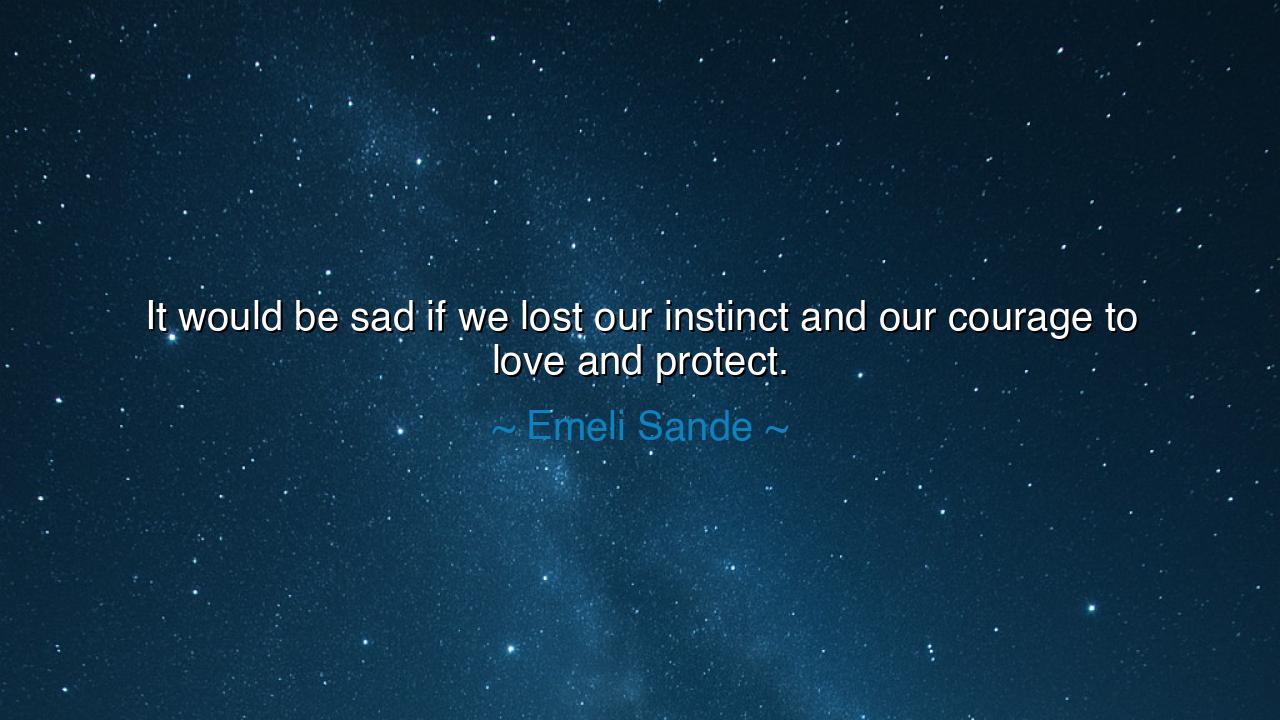
It would be sad if we lost our instinct and our courage to love






The singer and poet Emeli Sandé, whose voice carries both strength and tenderness, once spoke a truth that pierces the heart like a soft but steady flame: “It would be sad if we lost our instinct and our courage to love and protect.” In these words, she mourns not merely a fading emotion, but the possible dimming of humanity’s sacred light—the divine impulse to care, to defend, and to cherish one another. For she understood that love and protection are not luxuries of a gentle world; they are the very instincts that have carried us through the harshness of existence since time began. To lose them would be to lose ourselves—to become a people alive in body but dead in spirit.
The origin of this quote lies in Sandé’s deep empathy and her art, which often calls for healing and unity in times of division. In an age of noise and competition, she observed how modern life can dull the instinct to love—how fear, indifference, and self-preservation can make hearts grow cold. Yet she warns that this instinct is not merely sentimental; it is ancient and biological, born in the first mothers who shielded their children from danger, in the first tribes that shared fire to survive the dark. To love and protect is our truest inheritance, written into the marrow of our being. When we lose that instinct, we betray our own nature.
But Sandé also speaks of courage, for love without courage is easily silenced. To love in a wounded world—to protect what is fragile and good—requires bravery. It takes courage to remain gentle when cruelty seems to rule, to open the heart when it risks being broken, to stand up for the vulnerable when apathy is easier. True courage is not found in conquest or power, but in compassion that endures despite pain. The heroes of history are not only warriors; they are those who refused to stop loving when hatred was all around them.
Consider the story of Oskar Schindler, a man who began as a businessman seeking profit in wartime Germany, yet was transformed by the suffering he witnessed. At great personal risk, he sheltered and saved more than a thousand Jewish men and women during the Holocaust. His courage to protect sprang not from ideology, but from instinct—the human heart’s unyielding revolt against cruelty. Even when the world was drenched in fear, he remembered what Sandé reminds us of: that love and protection are not optional—they are sacred duties, the last defense of goodness in a collapsing age.
Emeli Sandé’s words are also a lament for our times. In a world of screens and speed, where empathy is often replaced by outrage and compassion by convenience, we risk losing touch with the pulse of our shared humanity. When she says, “It would be sad,” the sadness she speaks of is not weakness—it is prophetic sorrow, the mourning of a future where men and women no longer rush to help a stranger, where tenderness is mistaken for naivety, and where the cry for help is met with silence. The tragedy she envisions is not one of fire or war, but of indifference—a quiet extinction of the human heart.
And yet, in her gentle warning there is also hope. For if love and protection can be lost, they can also be rekindled. They dwell within each of us, waiting to be awakened by compassion and courage. To love is to recognize the divine spark in another; to protect is to honor that spark by standing guard over it. These instincts can be strengthened in daily acts—the kind word, the hand extended, the defense of the innocent, the forgiveness of the flawed. In such small acts lies the power to preserve what is most human in us.
So, my children of light, take this teaching as both a remembrance and a vow: do not let the heart grow numb, nor let fear silence your compassion. When you see suffering, let your instinct to love arise before your mind can hesitate. When you witness injustice, let your courage to protect outweigh your desire for safety. For the day we cease to love and protect is the day we cease to be fully alive. As Emeli Sandé reminds us, the true tragedy is not in hardship itself, but in the loss of our capacity to face hardship with tenderness.
Therefore, keep your love fierce, and your courage gentle. Be the guardian of compassion in a world that forgets its worth. Protect not only those you hold dear, but also the stranger, the weak, and the forgotten. For in this, you preserve the flame of humanity that has burned since the dawn of creation. And as long as that flame lives within you—the instinct and the courage to love and protect—no darkness can ever truly claim the world.






AAdministratorAdministrator
Welcome, honored guests. Please leave a comment, we will respond soon